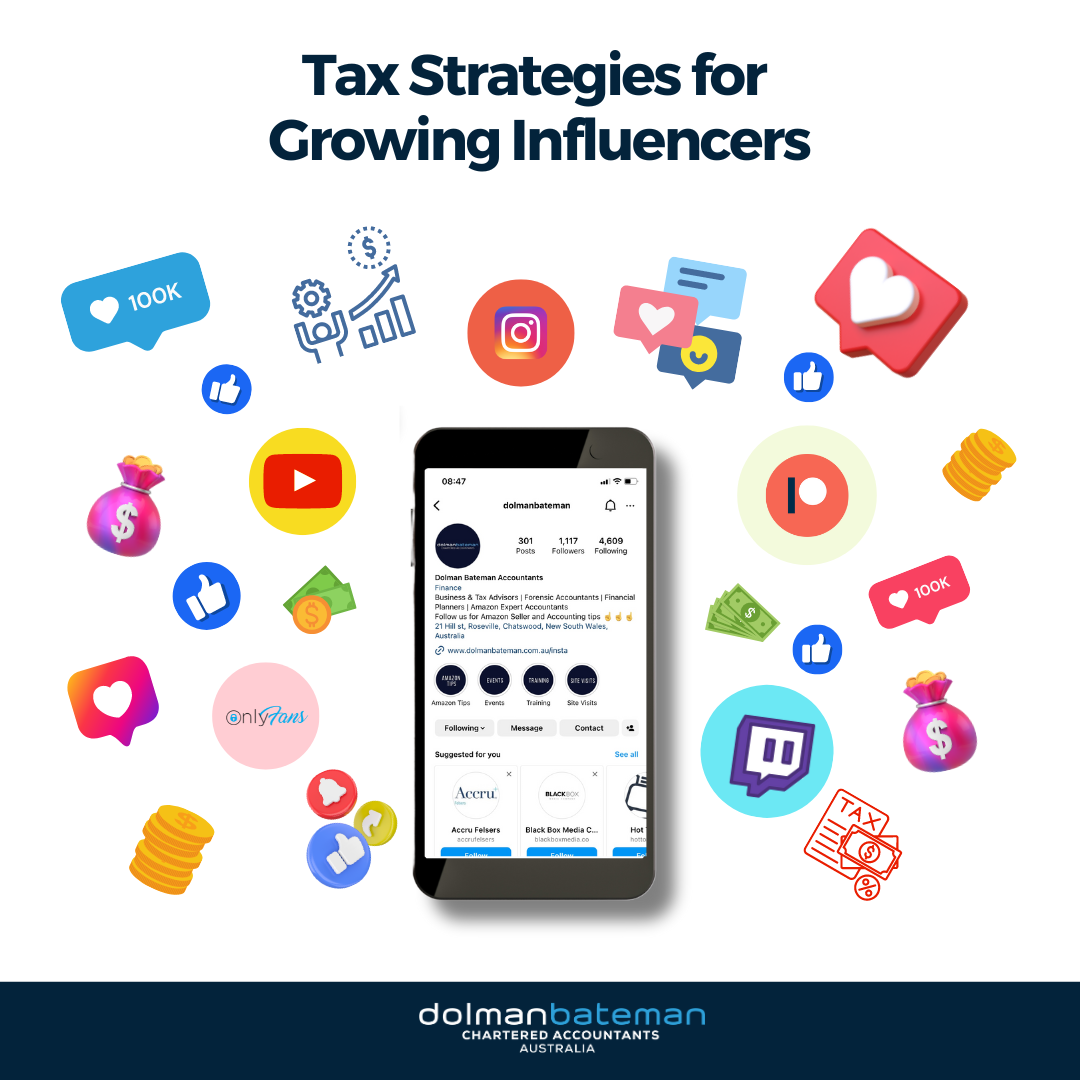In recent years, influencer marketing has become big business in Australia, with brands spending...
Tax Strategies for Growing Influencers: ATO Tips to Stay Ahead of the Game when Making Money on Instagram, YouTube, OnlyFans, Twitch, or Patreon

Shout out to influencers and content creators! 🌟 Let's talk about something that might not be as glamorous as posing for those Insta-worthy shots but is equally important: taxes! 💰 As you build your brand and influence on social media, it's crucial to understand your tax obligations and implement effective strategies to ensure financial success and compliance.
Creating online content as a business
Choose Your Business Structure: First things first, you need to decide how you want to structure your business. You have two common options: operating as a sole trader or establishing a company. Being a sole trader means you're personally responsible for your business activities and tax obligations. On the other hand, setting up a company separates your personal and business liabilities, but it does come with additional legal and administrative requirements.
Declare my income
Let’s not forget about tips and gratuities (sometimes described as gifts)
Sometimes, in the course of your business, you might receive goods, services, or other products in exchange for the goods or services you provide. This is commonly known as a barter transaction. Additionally, you might receive tips, gratuities, or even digital assets like cryptocurrencies. It's important to know that these non-cash benefits are considered as income and should be included in your tax return.
So, what kind of goodies or services might you receive?
- clothing, jewellery or accessories
- make up or skin care products
- gaming products
- flights or accommodation
- products or service provided by another organisation
- digital assets, such as cryptocurrency and NFTs
- other benefits you have received instead of money
When it comes to reporting the value of these non-cash benefits, the general rule is to consider the market value—what a stranger would normally pay in cash for the same goods, services, or property. That's the amount you should include in your tax return.
2. Keep Your Records in Check: Being organised is key! Make sure you maintain comprehensive records of your income, expenses, invoices, and receipts throughout the financial year. Thankfully, there are popular accounting software options like Xero or QuickBooks that can help simplify this process and keep your record-keeping on point.Deductions I can claim
Maximise Your Deductions: Who doesn't love deductions, right? As influencers and content creators, you may be eligible to claim deductions for expenses related to your work. Here are a few examples:
a) Equipment and Software: You can deduct expenses for cameras, laptops, editing software, lighting equipment, and any other tools necessary for your content creation.
b) Marketing and Promotion: Deduct expenses incurred for advertising, sponsored posts, or marketing campaigns.
c) Internet and Phone Expenses: If you use your personal phone or internet for business purposes, you can claim a portion of these expenses.
d) Travel and Accommodation: Deduct expenses related to work-related travel, conferences, and accommodation.
If you received a gift that was declared as income and you use it to make your content, you may be able to claim a deduction for this. An example is if you were gifted a webcam, you would declare the market value of this as income and claim the business use proportion of this as a deduction if you use this to record your content.
Something you should definitely keep on your radar
- Separate Personal and Business Expenses: Let's make our lives easier during tax season by keeping personal and business transactions separate. Maintain separate bank accounts and credit cards for your business to clearly distinguish between personal and business expenses. This practice will help you accurately track and report your business-related income and deductions.
- GST Registration: If your influencer or content creator business generates annual income of $75,000 or more, it's time to consider registering for Goods and Services Tax (GST). GST is a 10% tax applied to most goods and services consumed in Australia. Registering for GST allows you to claim back the GST paid on business expenses, but it also requires you to charge GST on your sales. It's an important step to be aware of if you reach the income threshold.
- Stay in the Loop: Tax laws can change, so it's essential to stay informed about any updates or modifications that might affect your tax obligations. Regularly visit the ATO website or consult with a tax professional to stay up to date with the latest tax legislation and regulations. It's always better to be in the know!
Remember, understanding your tax obligations and implementing effective strategies will not only help you achieve financial success but also keep you on the right side of the law. 💼💪 If you have any further questions, don't hesitate to reach out to Dolman Bateman 9411 5422 or book an appointment with one of our experienced accountants that can guide you through the process. Happy creating and stay tax-savvy! 📈📊 This blog has been prepared for the purposes of general information and guidance only. It should not be used for specific advice or used for formulating decisions under any circumstances. If you would like specific advice about your own personal circumstances, please feel free to contact us on 02 9411 5422. We can help make sure the right method is used to give you the maximum possible tax deduction associated with any of these methods.
This blog has been prepared for the purposes of general information and guidance only. It should not be used for specific advice or used for formulating decisions under any circumstances. If you would like specific advice about your own personal circumstances, please feel free to contact us on 02 9411 5422. We can help make sure the right method is used to give you the maximum possible tax deduction associated with any of these methods.



